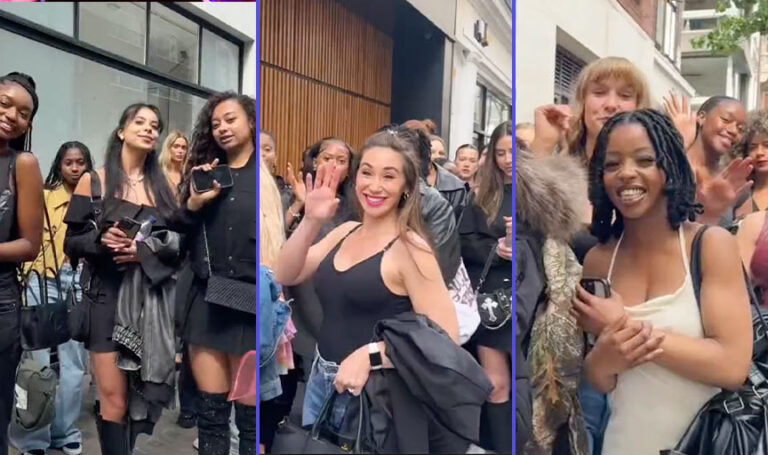PrettyLittleThing’s chaotic open casting call event is the fast fashion brand’s latest exploitative venture
In the bustling streets of Soho, London, a recent model casting event drew massive crowds, organised by fast fashion brand PrettyLittleThing (PLT), with over 5,000 women lining up in hopes of catching their big break. The scene was one of anticipation, with eager participants enduring over five hours of waiting time. Yet, behind the glamour and allure lies a darker reality orchestrated to fuel hype and foster a sense of community around the brand.
This event serves as a mechanism for PLT to acquire models at minimal cost, significantly undercutting industry standards for compensation. By bypassing agencies, the company avoids paying commission fees and can negotiate lower rates directly with aspiring models. Unfortunately, this approach leaves these industry newbies without the legal protection and support agencies typically provide.
@prettylittlething WHAT A TURN OUT!! 😱💘 Over 3000 of you are here for our Open Casting Day 🫶 Due to the overwhelming response, we are now at full capacity, we’re sad to say THE LINE IS NOW CLOSED. We still want to see you so keep hash-tagging #PLTSCOUTME for a chance to still be the next face of PLT🦄 Thank you to everyone who brought the vibe and waited so patiently for us to get round to seeing you 🫶
♬ A cheerful and upbeat song with a rhythmic guitar(1497708) - etsu
Model castings are pivotal moments for anyone wanting to kickstart their modelling careers, offering them a chance to showcase their talents and potentially secure lucrative contracts with top brands. However, the process is often marred by controversy and exploitation, with stories of mistreatment and abuse emerging far too often.
Netizens started noticing the alarming trend after witnessing so many individuals willing to align themselves with one of Britain’s most exploitative brands.
One individual stated: “People on TikTok talking about that disastrous PLT open-casting event are hilarious. Why would you expect one of the most unethical companies to treat you right? They don’t even treat their own garment workers or models right.”
Another user also noted: “Couldn’t quite believe my eyes yesterday. This is the open call casting for @prettylittlething in London. I was surprised by how many girls had shown up thinking this was going to be their break into modelling or working for PLT and wanted to be the face of such a horrendous brand.”
This sentiment reflects a broader disillusionment with companies prioritising profit margins over ethical considerations, prompting consumers to question their support for brands with questionable practices.
@isobelle_a_h Listen it is actually pretty genius #marketing #PLT #casting #exposure #views #pltcasting #london
♬ original sound - hairbyharleyy
PLT’s track record of unethical practices extends beyond its treatment of models, encompassing allegations of design theft from independent brands and environmental degradation.
The fast fashion brand is also part of the Boohoo Group, which operates globally and faced criticism for alleged worker exploitation. Recent scandals include links to a Leicester factory paying workers £3 and operating during COVID-19 lockdowns.
Yet, the sheer scale of the turnout at the Soho casting call-out highlights the fierce competition and desperation prevalent in the modelling world. For many, modelling represents not just a career but a dream—a ticket to fame, success, fulfilment, and financial stability. As a result, aspiring models are willing to endure long hours, harsh conditions, and even exploitation to pursue this elusive goal.
Some of the aspiring models voiced their frustration about the poorly organised event. After enduring hours of waiting, they were finally allowed inside, only to be asked to leave their Instagram contact on a whiteboard. This only further fueled their sense of being misled and scammed.
With PrettyLittleThing now estimated to be worth £3.8 billion, the Soho casting event serves as a stark reminder that the fast fashion brand’s exploitative nature does not stop at its workers. And despite years of campaigning from activists to try and disrupt PLT’s ever-expanding empire, this latest promotional scheme proves the brand is more popular than ever.






